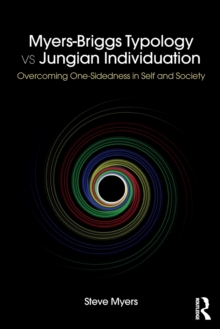Description
| Product ID: | 9781138230859 |
| Product Form: | Paperback / softback |
| Country of Manufacture: | GB |
| Title: | Myers-Briggs Typology vs. Jungian Individuation |
| Subtitle: | Overcoming One-Sidedness in Self and Society |
| Authors: | Author: Steve Myers |
| Page Count: | 228 |
| Subjects: | Psychoanalytical and Freudian psychology, Psychoanalytical theory (Freudian psychology), Psychological testing and measurement, Occupational and industrial psychology, Clinical psychology, Psychological testing & measurement, Occupational & industrial psychology, Clinical psychology |
| Description: | Select Guide Rating Myers demonstrates how overlooked aspects of Jung’s developmental theory can be greater applied by users of Myers-Briggs typology. This book provides an understanding of the main differences between Myers-Briggs typology and Jungian individuation, and describes eight principles to reconcile and overcome those differences. It also describes practical ways in which the principles can be used in personal, professional, group and cultural contexts. The book concludes with a look at common criticisms of the MBTI instrument, the main defences against them, and practical suggestions for incorporating Jungian individuation into coaching and workshops. In Myers-Briggs Typology vs Jungian Individuation: Overcoming One-Sidedness in Self and Society, Steve Myers unravels the century-long misinterpretation of Jung’s seminal text, Psychological Types, to show how Jung’s thinking offers solutions to the conflicts that have torn apart our societies. By challenging the popular interpretation of the Myers-Briggs Type Indicator® and similar instruments, Myers argues that we have not only missed Jung’s main proposition, but our contemporary interpretation runs counter to it. Myers aims to rediscover the overlooked argument of Jung’s Psychological Types and make it of practical relevance to contemporary issues. He intends to refocus rather than discard Myers-Briggs typology, showing that there are further stages of development after becoming a type and that typological principles have a much broader application. Raising queries about the way typology is used in contemporary society, Myers uses literary examples, such as Romeo and Juliet and Carl Spitteler’s Prometheus and Epimetheus, to show how one-sidedness leads to conflict and to illustrate Jung’s solution to the problem of opposites. He also applies this to real-life political crises by examining the decision-making of key political figures, such as Nelson Mandela, Robert Mugabe, and those involved in Brexit or the Northern Ireland peace process. The latter part of the book relates Jung’s process of typological development to his later writings on alchemy, notably the axiom of Maria, to show how they all have a common goal, the transformation of attitude. The book concludes by analysing the implications of the divergence of Myers-Briggs typology and Jungian individuation for the communities who use those ideas. This book puts Jungian individuation back at the forefront of debate and will be essential reading for intermediate and advanced users of Myers-Briggs typology. Due to its political relevance, it will also be of interest to Jungian analysts and their clients, and to academics and students of Jungian and post-Jungian ideas and political science. |
| Imprint Name: | Routledge |
| Publisher Name: | Taylor & Francis Ltd |
| Country of Publication: | GB |
| Publishing Date: | 2018-11-16 |


